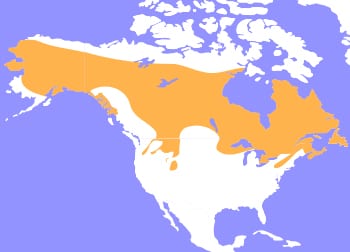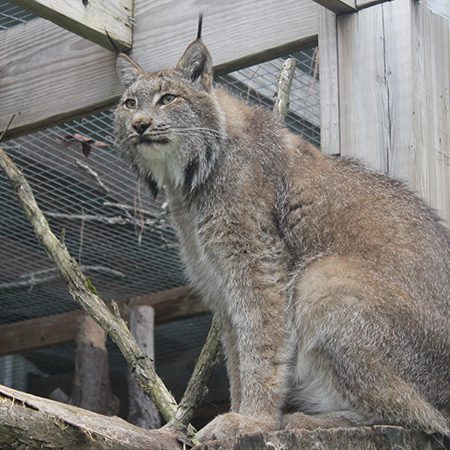Canadian Lynx
Lynx canadensis
Canadian Lynx is a lynx species native to North America, ranging across Canada and Alaska, extending into the Rocky Mountains and parts of New Mexico. A silvery-brown dense coat, and ruffled face with tufted ears are key features of the feline genus lynx. They are slightly larger than a bobcat, and over twice the size of a domestic cat. The Canada lynx is considered a medium-sized cat. They are about 3 feet long, standing nearly 2 feet tall! Canadian lynxes can weigh anywhere between 20-25 lbs.
In terms of body structure, the Canada lynx has forelimbs shorter than the hindlimbs, when walking the back appears to be sloping downward towards the front of the body. Like a bobcat, lynx are known to have a short stubby tail, measuring 2 - 6 inches. Their dense, long fur helps to insulate the feline in its frosty habitat. During the winter, the hair on their lower cheeks grow so long it appears to form a ruffle covering the throat. Their tufted ears are a distinguishing black color, with black spots also covering the body, and their tail being marked with black rings.
Canadian lynx paws have large toes that provide a better grip on their rocky terrain. They have 28 teeth, with four long canines for puncturing and gripping prey. These canines are heavily laced with nerves, helping it during hunting to know when it’s scored a meal. Behind these canines are carnassial (sharp upper and lower molar) teeth that help to cut the meat into smaller pieces. In order to use these carnassials, a lynx must chew meat with its head tilted to the side.
Say Hello To Cub Creek's Canadian Lynx: Jazz
Jazz came to camp as a 1 month old kitten in 2010. He was raised by the Martin family and grew up right in Lori’s house! When he became old enough he was introduced to our campers and was a beloved adopted animal. Now, Jazz, is one of camp’s most sought after encounters. Though he is large, he’s still a big kitten at heart! He can be seen playing from time to time with Lori, romping around like he did as a kitten.

This Lynx species is native to North America. It ranges across Canada and Alaska, extending into the Rocky Mountains of the United States.
HABITAT -They are found abundantly in the northern and mixed forests across Canada and Alaska.
DIET -Almost exclusively prey on the snowshoe hare, making up to 97% of their diet. With ducks, moles, squirrels being eaten when prey is low.
FUN FACT -Their furry paws are roughly 10cm x 10cm, almost 4 inches!
SOCIAL BEHAVIOR -Mostly solitary with minimal social interaction, with the exception of mating season.
ACTIVITY -They tend to be more nocturnal, active at night as the same time as their prey.
PREDATORS -Predators of the lynx include cougars, wolves, and coyotes, with humans being the biggest threat of all.
SIZE -They are about 3 feet in length, standing nearly 2 feet tall. They weigh between 20 - 25 lbs.
RELATIVES -There are four species of lynx under the genus, all related are the bobcat, Iberian lynx, and Eurasian lynx.
CONSERVATION -The Canadian Lynx is considered Least Concern on the IUCN Red List.
Cub Creek Animal Care Information
Housing - Our Canadian lynx has a large enclosure that spans several cubic feet on the outside, with an indoor portion attached. The indoor portion of his enclosure has different height levels with natural branches to allow for easy climbing. We have automatic water dispensers in both the indoor and outdoor enclosure, ensuring he always has clean water. For the outdoor portion of his enclosure, there are plenty of branches to allow for him to climb all around, with platforms high in the air for leisure. The ground is covered in lush green grasses, there are even rope toys built into his enclosure, for him to play with!
Diet - We stop at nothing to provide our Canadian lynx with an enriching diet that provides all the nutrition he needs. He eats a mixture of raw chicken meat, hearts, and giblets. We supplement his food with Oasis multivitamin supplement, helping to supply him with vitamin a, d3, e, k, b12, thiamine, riboflavin, biotin and more!
Enrichment - Jazz has rope toys built into their enclosure that they love to play with! Being bottle raised by the owner of camp, Jazz loves to play like any other feline and can be very sociable. We love to give them toys made from cardboard and paper bags to help keep her enclosure interesting. This allows them to demonstrate their species-typical curious behaviors.


